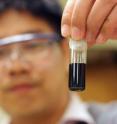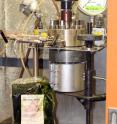Pressure-cooking algae into a better biofuel
Heating and squishing microalgae in a pressure-cooker can fast-forward the crude-oil-making process from millennia to minutes. University of Michigan professors are working to understand and improve this procedure in an effort to speed up development of affordable biofuels that could replace fossil fuels and power today's engines.
They are also examining the possibility of other new fuel sources such as E. coli bacteria that would feed on waste products from previous bio-oil batches.
"The vision is that nothing would leave the refinery except oil. Everything would get reused. That's one of the things that makes this project novel. It's an integrated process. We're combining hydrothermal, catalytic and biological approaches," said Phillip Savage, an Arthur F. Thurnau Professor in the U-M Department of Chemical Engineering and principal investigator on the $2-million National Science Foundation grant that supports this project. The grant is funded under the American Recovery and Reinvestment Act.
"This research could play a major role in the nation's transition toward energy independence and reduced carbon dioxide emissions from the energy sector," Savage said.
Microalgae are microscopic species of algae: simple, floating plants that don't have leaves, roots or stems. They break down more easily than other potential biofuel source plants because they don't have tough cell walls, Savage said.
Unlike fossil fuels, algae-based biofuels are carbon-neutral. The algae feed on carbon dioxide in the air, and this gets released when the biofuel is burned. Fossil fuel combustion puffs additional carbon into the air without ever taking any back.
The pressure-cooker method the U-M researchers are studying bucks the trend in algae-to-fuel processing. The conventional technique involves cultivating special, oily types of algae, drying the algae and then extracting its oil.
The hydrothermal process this project employs allows researchers to start with less-oily types of algae. The process also eliminates the need to dry it, overcoming two major barriers to large-scale conversion of microalgae to liquid fuels.
"We make an algae soup," Savage said. "We heat it to about 300 degrees and keep the water at high enough pressure to keep it liquid as opposed to steam. We cook it for 30 minutes to an hour and we get a crude bio-oil."
The high temperature and pressure allows the algae to react with the water and break down. Not only does the native oil get released, but proteins and carbohydrates also decompose and add to the fuel yield.
"We're trying to do what nature does when it creates oil, but we don't want to wait millions of years," Savage said. "The hard part is taking the tar that comes out of the pressure cooker and turning it into something you could put in your car, changing the properties so it can flow more easily, and doing it in a way that's affordable."
Savage and his colleagues are taking a broad and deep look at this process. They are investigating ways to use catalysts to bump up the energy density of the resulting bio-oil, thin it into a flowing material and also clean it up by reducing its sulfur and nitrogen content.
Furthermore, they're examining the process from a life-cycle perspective, seeking to recycle waste products to grow new source material for future fuel batches. This doesn't have to be algae, Savage said. It could be any "wet biomass." They are working on growing in their experiments' waste products E. coli that they could potentially use along with algae.
Source: University of Michigan
Other sources
- Pressure-cooking algae into a better biofuelfrom Science DailyMon, 26 Apr 2010, 4:32:00 UTC
- Pressure-cooking turns algae into biofuelfrom UPIFri, 23 Apr 2010, 17:00:40 UTC
- Pressure-cooking algae into a better biofuelfrom Science BlogThu, 22 Apr 2010, 22:26:57 UTC
- Pressure-Cooking Algae Into a Better Biofuelfrom Newswise - ScinewsThu, 22 Apr 2010, 20:31:40 UTC
- Pressure-cooking algae into a better biofuelfrom PhysorgTue, 20 Apr 2010, 22:30:29 UTC

